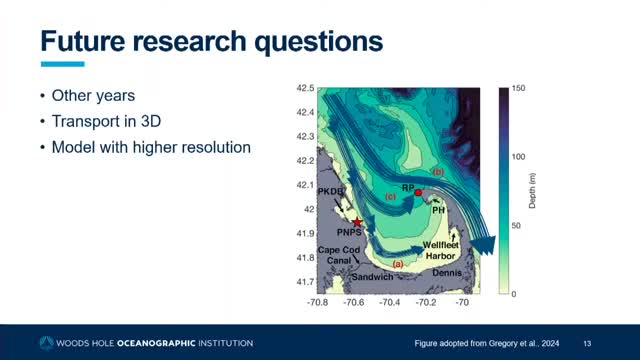Cape Cod Bay study highlights ocean currents and discharge effects
November 25, 2024 | Town of Plymouth, Plymouth County, Massachusetts
This article was created by AI summarizing key points discussed. AI makes mistakes, so for full details and context, please refer to the video of the full meeting. Please report any errors so we can fix them. Report an error »

During the recent meeting of the Plymouth Nuclear Decommissioning Citizens Advisory Panel, significant discussions centered around the environmental impacts of proposed wastewater discharges from the Pilgrim Nuclear Power Station. Experts presented findings from a study analyzing ocean currents and their potential effects on Cape Cod Bay, raising concerns about the legality and environmental safety of the discharge.
The panel reviewed a model based on two decades of data from drifting buoys, which illustrated how currents could transport discharged water throughout the bay. While the model suggested that the discharge would be diluted and less concentrated, panel members expressed skepticism about the implications of this discharge, particularly in relation to the Ocean Sanctuary Act, which prohibits certain types of discharges in protected areas.
One key point of contention was whether the proposed discharge would impact sensitive ecological areas, such as Stellwagen Bank, a marine sanctuary known for its rich biodiversity. The model indicated that some of the discharged water could flow into this area, prompting concerns about the potential effects on marine life.
Panel members also discussed the need for more detailed studies to better understand the depth and seasonal variations of water mixing in the bay. The conversation highlighted the importance of considering various environmental factors, such as temperature and salinity, in assessing the discharge's impact.
As the meeting concluded, public participants raised questions about the treatment of wastewater and the presence of radioisotopes, emphasizing the community's desire for transparency and thorough scientific evaluation. The panel's discussions underscored the ongoing debate about balancing energy needs with environmental protection, a concern that resonates deeply within the Plymouth community.
Moving forward, the panel plans to continue its examination of these issues, with the aim of ensuring that any actions taken align with both public safety and environmental stewardship.
The panel reviewed a model based on two decades of data from drifting buoys, which illustrated how currents could transport discharged water throughout the bay. While the model suggested that the discharge would be diluted and less concentrated, panel members expressed skepticism about the implications of this discharge, particularly in relation to the Ocean Sanctuary Act, which prohibits certain types of discharges in protected areas.
One key point of contention was whether the proposed discharge would impact sensitive ecological areas, such as Stellwagen Bank, a marine sanctuary known for its rich biodiversity. The model indicated that some of the discharged water could flow into this area, prompting concerns about the potential effects on marine life.
Panel members also discussed the need for more detailed studies to better understand the depth and seasonal variations of water mixing in the bay. The conversation highlighted the importance of considering various environmental factors, such as temperature and salinity, in assessing the discharge's impact.
As the meeting concluded, public participants raised questions about the treatment of wastewater and the presence of radioisotopes, emphasizing the community's desire for transparency and thorough scientific evaluation. The panel's discussions underscored the ongoing debate about balancing energy needs with environmental protection, a concern that resonates deeply within the Plymouth community.
Moving forward, the panel plans to continue its examination of these issues, with the aim of ensuring that any actions taken align with both public safety and environmental stewardship.
View full meeting
This article is based on a recent meeting—watch the full video and explore the complete transcript for deeper insights into the discussion.
View full meeting
